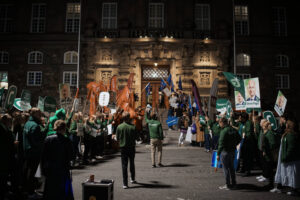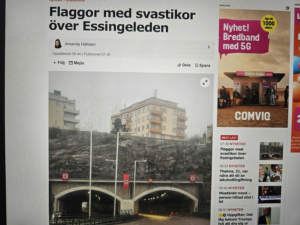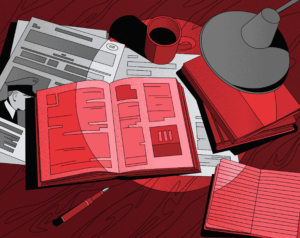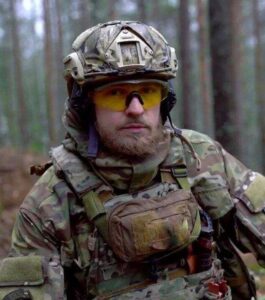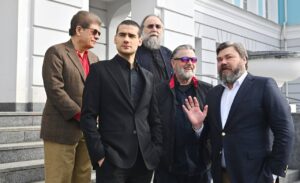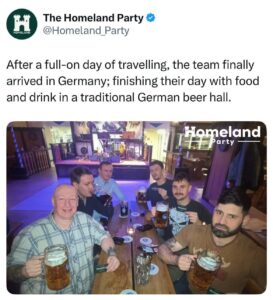
This article was first published by the Rosa Luxemburg Foundation here.
In December of last year, the German public was rocked by news that authorities had arrested several dozen members of a suspected far-right network calling itself the “Patriotic Movement”. The group, a motley collection of COVID-19 deniers, QAnon followers, and members of the Reichsbürger scene, included several retired officials from the military and security apparatus, a former MP from the right-populist Alternative für Deutschland (AfD), and a German aristocrat with blood relations to Princess Beatrix of the Netherlands and King Frederick IX of Denmark. Many of them had been active in conspiracy theorist groups for years.
Reichsbürger, or “citizens of the Reich”, believe that Germany has been under Allied occupation since 1945, and that the contemporary Federal Republic does not (legally) exist and is thus illegitimate. Operating on this belief, the so-called Patriotic Union planned to overthrow the sitting government and re-establish the German Reich — hopefully with the assistance of Russia, although the latter declined the group’s overtures for support. When the ringleaders were arrested last December, they were caught with plans to storm the German parliament and a cache of illegal weapons with which to do so.
Investigations have continued into this year, with a second raid against further Reichsbürger on 22 March ending in an exchange of fire between a suspect and the police. How big is this network of far-right conspiracists, and how serious is the threat they pose to liberal democracy in Germany? Die Linke MP and spokesperson for antifascist policy Martina Renner spoke with the Rosa Luxemburg Foundation’s Anika Taschke about these questions and the fight against far-right extremism in Germany today.
A network of people belonging to the Reichsbürger was uncovered in December. What exactly happened?
The Federal Public Prosecutor General, the highest-level government investigator in Germany, had more than 50 suspects raided. Of those, 23 were arrested. That network, known as the Patriotic Union, is accused of planning a right-wing coup d’état.
It is unclear how far the planning had gone, but they had money and weapons, for example, to push their way into the parliament, abduct elected representatives, and pressure the government. But they also talked about liquidating people.
Who was behind the network?
The people behind this network include all the active parties we’ve seen in right-wing terror trials and investigations in recent years. That includes police officers and soldiers, but there are also connections to the right-wing party Alternative für Deutschland (AfD). It’s particularly worth noting that a former AfD member of parliament was among them.
Beyond that, there are links with the Reichsbürger scene and people who took to the streets to protest against public health measures during the COVID-19 pandemic and who were radicalized in the process. The whole thing is undergirded by connections to the extreme right and antisemitic conspiracy theories.
These are bourgeois, middle-class people. They have money, families, homes, and status, and they’re willing to give it all up because they believe in a doomsday scenario.
Is there an active relationship between the people who are now in jail and the AfD?
Among those arrested is a former AfD member of parliament and at least two others who are or were active AfD members. One other — the weapons dealer — has donated to the AfD in the past. Links between the AfD and these right-wing terror structures are evidently not hard to find.
Who are the Reichsbürger and how would you characterize their ideology?
First and foremost, I should say that the so-called Reichsbürger are not a new phenomenon on the far right. They’ve been around for many years. They believe that the Federal Republic of Germany is illegitimate and ruled from abroad by foreign powers. The German government is just a puppet of an alleged secret world government in their narrative.
It is important to note that this narrative includes antisemitic elements, insofar as these often refer to a global Jewish conspiracy. Reichsbürger also believe that the German Reich still exists, not today’s Federal Republic. Therefore, they claim that the state is illegitimate and betrays the interests of the people.
Martyrdom and heroic gestures can persist because structures like the military or the police are not democratically organized. It’s a culture with a low tolerance for error, which means that the people who oppose it are silenced.
When they talk about Volk, “the people”, they mean the ethnonationalist idea of a German community defined by blood. They believe that the German government deliberately wants to destroy the Volk through migration, as well as through vaccinations or sanctions against Russia.
The specific objects of their theories are interchangeable. This is where historical revisionism converges with ethnonationalist thinking and authoritarianism. The motive remains the same: rejection of democracy and introduction of a Führerstaat, an autocratic state under one absolute leader.
The reporting on the raid on the “Reichsbürger network” often emphasizes a “Day X”. What does that term mean?
“Day X” denotes the moment when state and society collapse. It’s important to note that we aren’t primarily talking about preparations for a day like that, but rather about attempts to actively hasten the arrival of that day.
Day X is a symbol of the alleged failure of democracy and the constitutional state, and of the need for a violent right-wing coup. That way of thinking focuses on the people and institutions that may stand in the way of a coup: leftists, journalists, representatives, broadcasters, etc. People on the Right compile enemy lists for these scenarios, which are actually extermination fantasies. Those lists especially include people who are committed to combatting the Right.
But Day X and hit lists are nothing new in right-wing attack plans. We’ve seen them both historically under German fascism, but they were also present during the period after 1945, for instance in organizations like the Bund Deutscher Jugend or the Wehrsportgruppe Hoffmann.[1]
Elite soldier Franco Albrecht, for instance, planned a “false flag” attack. He posed as a Syrian refugee and wanted to carry out terror attacks to bring about a kind of Day X. Gruppe S planned to attack mosques. Both wanted to destabilize the country by pinning the blame for these attacks on refugees or Muslims.
Other groups want to attack the power grid to cause blackouts. The approach to doing it varies, but the goal is very similar: Day X, a fascist insurrection, seizure of power.
You’ve already mentioned that the people who were arrested included members of German state institutions. How does right-wing ideology, and therefore right-wing structures, become rooted in these particular institutions?
There are several reasons for that. On the one hand, there’s still an ineffable adherence to tradition, particularly in parts of the German military, that is directly linked to an understanding of the self and the enemy, as well as myths and ideological elements of Nazism. On the other hand, police and the military simply attract certain people.
Both do not reflect the societal average as people often claim. On the contrary, the police and the military are whiter, more male, and more authoritarian than society at large. Also, elite units like the KSK [Special Forces Command of the German military] play a particularly crucial role. The cult of the elite promotes anti-democratic tendencies and separation from public and democratic oversight.
For example, the paratroopers have adopted the Nazi tradition of being the army’s elite, who sacrifice themselves even when the battle is hopeless — and who exist to serve the Volk. Martyrdom and heroic gestures can persist because these structures, like the military or the police, are not democratically organized. It’s a culture with a low tolerance for error, which means that the people who oppose it are silenced.
Right now, there is a very high level of danger that we could have a renewed racist mobilization leading to a situation similar to the 1990s.
Anti-communism is still a big part of that, even today. It isn’t as present in the historical tradition as it was in, say, the 1980s, but the prevailing view is still that you have to be ready to fight against the internal enemy. And that internal enemy is still understood to be on the Left. That is the alarming position to start from.
Although, to be honest, I have to admit that despite all the analysis, I have also been surprised that we’ve seen extreme right-wing incidents in areas where I didn’t expect them as well. In the Federal Criminal Police Office, for example, they have a unit that’s responsible for protecting both German elected officials travelling abroad as well as state visitors in Germany. It’s a small unit, but investigations and disciplinary proceedings have implicated most of its officers. We’re not talking about one person out of 20, but rather 11 out of 16.
Do you think that the problem of armed right-wing actors in state institutions has changed in recent years?
My impression is that the problem has intensified. For one thing, that’s because there’s been such a strong rightward trend in society in general, and therefore also in the institutions. Thinking in terms of a male, white elite, but also being armed and wearing a uniform contributes a lot to that.
On the other hand, I also think that there’s been an organized effort to utilize these structures — meaning organizing within the military and the police. That’s different from the 1990s. The attack from within is currently being organized.
The danger is that we could find ourselves in dangerous situations if people with political and official power don’t recognize that. It’s possible that individuals could emerge from these contexts and take action.
Is right-wing terrorism directed more at institutions, or are there also terrorist plans against specific groups?
The Day X scenario is what we talked about before. It certainly doesn’t mean that there’s no longer any right-wing terror against minorities, or racist and antisemitic right-wing terror. Those still exist, and in Germany, we mourn our dead because of that terror.
I see right-wing racist terror as overlapping with Day X terror. Right now, I would say there is a very high level of danger that we could have a renewed racist mobilization leading to a situation similar to the 1990s, where actual attacks on refugees and their housing in particular could increase again. In that case, there would be overlaps with this group that we’ve been talking about. We would particularly have to look out for regional right-wing structures. They are primarily organized around racism — disguised as militias or citizens’ initiatives.
[1] Translator’s note: The Bund Deutscher Jugend was a West German paramilitary anti-communist organization founded in 1950. It was supported by the US government and its membership consisted largely of former Nazi-era soldiers, including veterans of the Waffen-SS. Former SS-Hauptsturmführer Hans Otto is known to have maintained “blacklists” on behalf of the group, which was banned in 1953 on the grounds that it was a partisan paramilitary organization. The Wehrsportgruppe Hoffmann was founded in Frankfurt in 1973 by neo-Nazi Karl-Heinz Hoffmann. Over the nine years that followed, group members were responsible for upwards of 20 deaths by shooting and bombing. It was banned in 1980.
